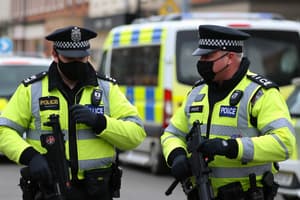Podcast
Questions and Answers
What is one of the primary roles of sheriff deputies in courthouses?
What is one of the primary roles of sheriff deputies in courthouses?
- To conduct investigations outside the courtroom
- To issue traffic fines
- To ensure the safety of judges, jurors, and the public (correct)
- To serve as the main law enforcement agency for the city
How is the police commissioner typically appointed?
How is the police commissioner typically appointed?
- Elected by the public through a general vote
- Appointed by the city’s mayor, city council, or similar governing body (correct)
- Selected by a panel of law enforcement officials
- Chosen by popular vote among police officers
What distinguishes the role of a sheriff from that of a police commissioner?
What distinguishes the role of a sheriff from that of a police commissioner?
- Sheriffs are typically required to work within a city
- Sheriffs have no political affiliations
- Police commissioners oversee rural areas
- Sheriffs are elected officials, while police commissioners are appointed (correct)
What motivates many police officers in their line of duty?
What motivates many police officers in their line of duty?
Why might sheriffs have more independence compared to police commissioners?
Why might sheriffs have more independence compared to police commissioners?
What is one of the primary responsibilities of a police officer?
What is one of the primary responsibilities of a police officer?
Which of the following is not a requirement to become a police officer?
Which of the following is not a requirement to become a police officer?
What is the maximum annual salary for a probationary police officer?
What is the maximum annual salary for a probationary police officer?
Which of the following duties is unique to sheriff deputies compared to police officers?
Which of the following duties is unique to sheriff deputies compared to police officers?
What task is involved in the Job-Related Task Assessment (JTA) for police officers?
What task is involved in the Job-Related Task Assessment (JTA) for police officers?
How do police officers enforce the laws?
How do police officers enforce the laws?
What is a key difference between the jurisdiction of police officers and sheriff deputies?
What is a key difference between the jurisdiction of police officers and sheriff deputies?
What happens after a suspect is arrested?
What happens after a suspect is arrested?
What is one reason police officers carry their equipment daily?
What is one reason police officers carry their equipment daily?
Which code indicates a request for assistance?
Which code indicates a request for assistance?
What ethical principle emphasizes the need for officers to be answerable for their actions?
What ethical principle emphasizes the need for officers to be answerable for their actions?
In a situation involving a domestic disturbance, how should personal relationships affect an officer's decision-making?
In a situation involving a domestic disturbance, how should personal relationships affect an officer's decision-making?
Which signal indicates a hit and run incident?
Which signal indicates a hit and run incident?
Which ethical principle requires officers to treat everyone with dignity?
Which ethical principle requires officers to treat everyone with dignity?
What is the purpose of a police badge in the context of a police officer's duties?
What is the purpose of a police badge in the context of a police officer's duties?
Which code is used to describe a bomb threat?
Which code is used to describe a bomb threat?
What should a police officer prioritize when responding to multiple urgent situations?
What should a police officer prioritize when responding to multiple urgent situations?
When assessing the reliability of a confidential informant, what primary factor should an officer consider?
When assessing the reliability of a confidential informant, what primary factor should an officer consider?
How should an officer approach a situation with an aggressive suspect who is unarmed?
How should an officer approach a situation with an aggressive suspect who is unarmed?
In the event an officer discovers unrelated personal information during an investigation, what is the primary ethical concern?
In the event an officer discovers unrelated personal information during an investigation, what is the primary ethical concern?
What is a significant factor influencing an officer’s decision to pursue a speeding driver during an emergency response?
What is a significant factor influencing an officer’s decision to pursue a speeding driver during an emergency response?
What potential consequence must officers consider when deciding to use physical force?
What potential consequence must officers consider when deciding to use physical force?
When evaluating a tip from a potentially unreliable informant, what should officers primarily focus on?
When evaluating a tip from a potentially unreliable informant, what should officers primarily focus on?
What guiding principle should influence an officer's approach to handling sensitive personal information?
What guiding principle should influence an officer's approach to handling sensitive personal information?
What was the primary purpose of the first organized police force established in London in 1829?
What was the primary purpose of the first organized police force established in London in 1829?
Which technological advancement in the 20th century allowed police to respond to emergencies more quickly?
Which technological advancement in the 20th century allowed police to respond to emergencies more quickly?
What investigative technique saw significant development during the 19th century?
What investigative technique saw significant development during the 19th century?
Which of the following tools was introduced to aid police accountability in the late 20th century?
Which of the following tools was introduced to aid police accountability in the late 20th century?
What significant development occurred in the 1960s that improved police operations?
What significant development occurred in the 1960s that improved police operations?
Which policing strategy was emphasized with the establishment of police uniforms in the 19th century?
Which policing strategy was emphasized with the establishment of police uniforms in the 19th century?
What was one impact of the telegraph on police work during the 19th century?
What was one impact of the telegraph on police work during the 19th century?
Which federal agency was created in the mid-20th century to combat organized crime?
Which federal agency was created in the mid-20th century to combat organized crime?
Flashcards are hidden until you start studying
Study Notes
Role of Police Officers
- Enforce laws to maintain order and protect citizens.
- Responsibilities include patrolling, conducting investigations, and making arrests based on warrants or direct observations of crimes.
Requirements to Become a Police Officer
- Minimum annual salary ranges from 58,451.90(probationary)to58,451.90 (probationary) to 58,451.90(probationary)to103,204.92.
- Must be at least 21 years old with a high school diploma and 2 years of college education.
- Clean criminal record, successful background check, and physical examination required.
- Must pass the Criminal Justice Basic Abilities Test (CJBAT) and a Job-Related Task Assessment (JTA).
Duties of Police Officers
- Patrolling: Officers are assigned areas to monitor for criminal activity.
- Investigations: Involves interviewing witnesses, collecting evidence, and writing reports.
- Arrests: Officers can arrest individuals based on visible crimes or outstanding warrants.
- Emergency Response: Respond to 911 calls and conduct traffic stops as part of their duties.
Role of Sheriffs
- Sheriffs are elected officials with jurisdiction over entire counties, unlike police officers who typically serve specific cities.
- Responsibilities include managing county jails, serving legal documents, maintaining courtroom security, and law enforcement in rural areas.
Comparison Between Police and Sheriffs
- Police departments are led by appointed commissioners, often under political influence; sheriffs are elected and accountable to the public.
- Sheriffs might have greater independence due to their elected status.
Motivation of Police Officers
- Driven by a commitment to uphold the law and ensure public safety.
- Desire to contribute positively to society and assist individuals in need.
Communication Codes Used in Law Enforcement
- Police use specific codes for various situations (e.g., 10-4 means OK, 10-55 indicates a drunk driver).
- Signals for emergencies, pursuits, and other important situations facilitate rapid communication.
Ethical Principles for Police Conduct
- Integrity: Acting with honesty and transparency.
- Respect: Treating all individuals with dignity.
- Accountability: Taking responsibility for actions.
- Impartiality: Making unbiased decisions based on facts.
Scenarios Illustrating Ethical Decision-Making
- Family Connection: Addressing personal relationships ethically in law enforcement situations.
- Emergency Exemption: Balancing immediate emergency responses with routine enforcement actions.
- Confidential Informant: Evaluating the credibility of informants against public safety risks.
- Use of Force: Deciding between de-escalation and physical intervention in confrontations.
- Privacy Concerns: Weighing investigative needs against individuals' privacy rights.
History of Policing
- 18th Century: Modern policing began in response to crime rates, with London's Metropolitan Police Service established in 1829.
- 19th Century: Growth of forces, introduction of uniforms, and early investigative techniques emerged.
- 20th Century: Advancements like the telephone, radio, and forensic science transformed policing practices.
Technological Advancements in Policing
- Introduction of two-way radios, automobiles, and computers improved coordination and response times.
- Development of the 911 emergency system and the use of TASERs and body cameras for accountability and safety.
Forensics Evolution
- Automated Fingerprint Identification Systems (AFIS) introduced in the 1980s for efficient suspect identification and cold case resolution.
Studying That Suits You
Use AI to generate personalized quizzes and flashcards to suit your learning preferences.




